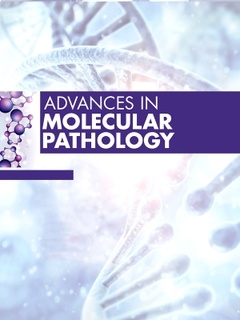Description
Advances in Molecular Pathology, 2021
Advances Series
Coordinator: Tsongalis Gregory J.
Language: English
Subject for Advances in Molecular Pathology, 2021:
Publication date: 10-2021
Support: Print on demand
Support: Print on demand
Description
/li>Contents
/li>Biography
/li>
Advances in Molecular Pathology is an annual review publication that covers the current practices and latest developments in the field of Molecular Pathology. Each issue is divided into sections for comprehensive coverage of all subspecialty areas within molecular pathology, including, Genetics, Hematopathology, Infectious Disease, Pharmacogenomics, Informatics, Solid Tumors, and special topics on COVID-19. The Editor-in-Chief of the publication is Dr. Gregory Tsongalis, a leading expert in the field. Topics covered this year include but are not limited to: Phenotype Association and Variant Pathogenicity Prediction Tools in Genomic Analysis; The application of noninvasive prenatal screening to detect copy number variations; Next generation cytogenomics using optical mapping; Review of molecular in APL; NGS for MRD in acute leukemia; Review of emerging technologies as they pertain to infectious disease testing; Germline genetic variants that predict drug response; Nutrigenomics; PGx of hypertension; Genomic data for blood typing, specifically both through NGS and arrays; Preanalytic Variables and Tissue Stewardship for Reliable Next-Generation Sequencing (NGS) Clinical Analysis; and Cell-free nucleic acids in cancer: Current approaches, challenges, and future directions.
Current Tools, Databases, and Resources for Phenotype and Variant Analysis of Clinical Exome Sequencing
Applications of Noninvasive Prenatal Testing for Subchromosomal Copy Number Variations Using Cell-Free DNA
Applications of Optical Genome Mapping in Next-Generation Cytogenetics and Genomics
Diagnosis of Variant Translocations in Acute Promyelocytic Leukemia
Next-Generation Sequencing for Measurable Residual Disease Assessment in Acute Leukemia
Molecular Profile of BCR-ABL1 Negative Myeloproliferative Neoplasms and Its Impact on Prognosis and Management
Engineering Consideration for Emerging Essential Nucleic Acid Tests for Point-of>Care Diagnostics
The Importance of Use of Genetics to Guide Hypertension Therapy: Using b>Blockade as an Example
Emerging Molecular Diagnostic Methods for Prosthetic Joint Infections
The Role of the Human Gutome on Chronic Disease: A Review of the Microbiome and Nutrigenomics
Blood Group Genotyping
Artificial Intelligence in Anatomic Pathology
Cell-free Nucleic Acids in Cancer: Current Approaches, Challenges, and Future Directions
Tumor Mutational Burden Calculation and Microsatellite Instability Detection in Clinical Next-Generation Sequencing Assays
Operationalizing Genomic Medicine: Laboratory Practice Considerations Beyond the Assay
A PENNdemic Year in Review
Review of SARS-CoV-2 Antigen and Antibody Testing in Diagnosis and Community Surveillance
The Genomic Landscape of Severe Acute Respiratory Syndrome Coronavirus 2: Surveillance of Variants of Concern
Applications of Noninvasive Prenatal Testing for Subchromosomal Copy Number Variations Using Cell-Free DNA
Applications of Optical Genome Mapping in Next-Generation Cytogenetics and Genomics
Diagnosis of Variant Translocations in Acute Promyelocytic Leukemia
Next-Generation Sequencing for Measurable Residual Disease Assessment in Acute Leukemia
Molecular Profile of BCR-ABL1 Negative Myeloproliferative Neoplasms and Its Impact on Prognosis and Management
Engineering Consideration for Emerging Essential Nucleic Acid Tests for Point-of>Care Diagnostics
The Importance of Use of Genetics to Guide Hypertension Therapy: Using b>Blockade as an Example
Emerging Molecular Diagnostic Methods for Prosthetic Joint Infections
The Role of the Human Gutome on Chronic Disease: A Review of the Microbiome and Nutrigenomics
Blood Group Genotyping
Artificial Intelligence in Anatomic Pathology
Cell-free Nucleic Acids in Cancer: Current Approaches, Challenges, and Future Directions
Tumor Mutational Burden Calculation and Microsatellite Instability Detection in Clinical Next-Generation Sequencing Assays
Operationalizing Genomic Medicine: Laboratory Practice Considerations Beyond the Assay
A PENNdemic Year in Review
Review of SARS-CoV-2 Antigen and Antibody Testing in Diagnosis and Community Surveillance
The Genomic Landscape of Severe Acute Respiratory Syndrome Coronavirus 2: Surveillance of Variants of Concern
Gregory J. Tsongalis, PhD, HCLD, CC, FNACB., is the Vice Chair for Research and the Director of the Laboratory for Clinical Genomics and Advanced Technology (CGAT) in the Department of Pathology and Laboratory Medicine at the Dartmouth-Hitchcock Medical Center and Norris Cotton Cancer Center (NCCC) in Lebanon, NH. He is a Professor of Pathology and Laboratory Medicine at the Audrey and Theodor Geisel School of Medicine at Dartmouth in Hanover, NH and a member of the NCCC Molecular Therapeutics Program and the gastrointestinal and breast cancer clinical oncology groups. In 2016 he became a member of Dartmouth College's Program in Experimental and Molecular Medicine (PEMM), and he has served on the advisory board of the Health Care Genetics Professional Science Master's Degree Program and Diagnostic Genetic Sciences Program at the University of Connecticut (Storrs, CT). His area of expertise is in the development and implementation of clinical molecular diagnostic technologies. His research interests are in the pathogenesis of human cancers, personalized medicine and disruptive technologies. He has authored/edited twelve textbooks in the field of molecular pathology, published more than 230 peer reviewed manuscripts, and has been an invited speaker at both national and international meetings. He has served on numerous committees of the American Association for Clinical Chemistry, the American Society for Investigative Pathology, the Federation for American Societies for Experimental Biology, and the Association for Molecular Pathology (where he is a past President). He is active in the Alliance for Clinical Trials in Oncology, the Association for Molecular Pathology, the American Association for Clinical Chemistry, the American Association of Bioanalysts, and the American Society for Investigative Pathology. He serves on the editorial boards of 8 journals including Clinical Chemistry, Experimental and Molecular Pathology, and the Journal of Molecular Diagnostics. In
© 2024 LAVOISIER S.A.S.




